
2015 T HE A MERICAN C HESTERTON S OCIETY Printed in the United States of America Cover photo by Greg Benz Photography Cover design by Richard Aleman Interior design by Ted Schluenderfritz LCCN: 2014944520 ISBN: - - 9744495 - -
ALSO AVAILABLE FROM ACS BOOKS
The Return of Father Brown by John Peterson
The Hound of Distributism edited by Richard Aleman
The Catechism of Hockey by Alyssa Bormes
Jousting with the Devil by Robert Wild
To three men who have walked the road with me:
Nathan Allen, Ted Olsen, and Art Bowman
A man is not really convinced of a philosophic theory when he finds that something proves it. He is only really convinced when he finds that everything proves it.
G . K . C HESTERTON
CONTENTS
INTRODUCTION
Becoming Catholic was the most difficult decision of my life. It was a decision I had to defend at the time I entered the Church and again almost every day since. And it was a decision I have never once regretted.
In this book, I will begin with an unnecessarily long prologue telling the story of my conversion. But the rest of it is composed of mercifully short and hopefully sweet accounts of some of the encounters that happened afterwards, the opportunities where I have had the pleasure of defending the faith that I have embraced. There is always someone or something fighting the Catholic Church, and I have found it nothing less than sublime to give them the fight they are asking for. But while defending the faith provides the exhilaration of battle, it also provides a certain serenity, a peace of mind that comes from having the truth reaffirmed at every turn. If Christianity should happen to be true, says G.K. Chesterton, then defending it may mean talking about anything or everything. Things can be irrelevant to the proposition that Christianity is false, but nothing can be irrelevant to the proposition that Christianity is true. Anything and everything. That is what these short meditations are about. The doctrines and teachings of the Catholic Church relate to every conceivable subject, but conversely, every subject, every idea, every issue is a ready opportunity to demonstrate the truths of the Catholic Church. Everything has a way of pointing to the truth. I suppose another way of saying it is that all roads lead to Rome.
Because the universal truth applies to everything, there is often the urge, when engaged in apologetics, to say everything at once. The challenge in trying to make distinct points is to avoid repeating oneself when making other distinct points. You will see that I have failed miserably in that regard. It is almost impossible not to repeat oneself when each point is so intimately connected. You will also note my glorious weakness in quoting my friend Mr. Chesterton to illustrate nearly every point, though sometimes I lapse into quoting the Church Fathers, or even, in extreme cases, Scripture. It is the part of my apologetics for which I make no apology. Also, I have the happy tendency to refer to Chesterton in the present tense. Though my jolly mentor has a better grasp on current events than any other writer I know, I should probably point out that he died in 1936 . Timeless truths are the bane of calendar-keepers.
While some of these chapters appear here for the first time, most of them had an earlier, though different form of life in The Catholic Servant , Chronicles , Crisis , The Coming Home Newsletter , Dappled Things and of course, Gilbert which is the best magazine in the world. My thanks to all of these fine publications. My greatest thanks, however, is to the woman who spends most of her time being my wife and the mother of our six children, but some of her time being my severest literary critic.
Finally, though defending the faith involves taking up arms against any challenger we meet along the road, it is ultimately an act of charity. Our goal is not to crush our opponents but to convert them. We should never forget this goal. Some of the former enemies of the Church have become her most passionate defenders. While I am an unworthy example, it is still an honor to be included in their ranks.
PROLOGUE
My Road
He was called the Father of Jesus Rock. Everyone who was an Evangelical or Pentecostal Christian in the 1970 s knew who he was. He wrote such songs as I Wish Wed All Been Ready, U.F.O. One Way, I am a Servant, and Righteous Rocker, Holy Roller. He was the one who lamented playfully, Why Should the Devil Have All the Good Music? He had brilliant lyrical and musical gifts. He could hold an audience in the palm of his hand, easily making them rock with laughter or roll with praise, or making them very quiet and thoughtful.
His name was Larry Norman. And he was married to my sister.
My brother-in-law was certainly one of the most influential people in my life. As a teenager in the 1970 s, I, too, wore my hair long and played the guitar and wrote songs. I was also an outspoken Christian, and everyone who knew me knew I was a Christian. I was unafraid to share my faith, unafraid to defend it. I probably was not very good at either. I certainly was not good at living up to it.
Larry not only helped pay for my college education, he provided some fascinating summer employment in his office and recording studio in Los Angeles, which was a long way from my home in St. Paul, Minnesota. With him, I always felt right in the thick of things. And during those interesting summers, I had long talks with him about everything: music and movies and art and love and the world and God.
But his primary influence on me was not those talks or his dynamic personality or that creative intellect or the fact that he was married to my sister or that he was too religious for the rock-and-roll people and too rock-and-roll for the religious people. It was something else. It happened one day when he saw me reading Mere Christianity .
You like C.S. Lewis? he asked.
With great wit and profundity, I replied, Yeah.
Have you ever read any G.K. Chesterton?
Ive never heard of G.K. Chesterton.
Chesterton is a lot better than C.S. Lewis. In fact, if you read Chesterton, you wouldnt even need to read C.S. Lewis, because all of Lewis is inside Chesterton.
To me this bordered on blasphemy, but the comment stuck in my head. I soon began to notice references to Chesterton here and there in Lewis writings. I then discovered that C.S. Lewis had been a confirmed atheist until he read The Everlasting Man by G.K. Chesterton. Lewis said that a young man who is serious about his atheism cannot be too careful about what he reads. He called The Everlasting Man the best book of apologetics in the 20 th century. But it would be four more years before I would actually get my hands on a Chesterton book, and a lot of things changed in those intervening years. Larry divorced my sister, and his career as a Jesus Rock singer began a steady decline. I graduated from college, and in 1981 , got married.
My wife Laura and I went to Italy on our honeymoon. She had been born there, and it was nice to have her along since she spoke the language. We were in Rome on a rather momentous day: May , 1981 , the day Pope John Paul II was shot. We were in the Church of St. Peter-in-Chains, looking at Michelangelos statue of Moses, when we heard the news. As we walked back to our hotel room, we watched the city transform from utter chaos to an eerie calm. After the sirens died down, the streets became strangely empty, and a silence descended on Rome. It was as if everyone went home to pray. A few days later street vendors were selling postcards of the Pope waving from his hospital bed.
Little did I know that my path to Rome began in Rome. The city amazed me in every way, with the weight of its history and beauty, and with the urgency and significance of what was happening at that very moment. But the farthest thing from my mind was that I would ever become a Catholic. I was only there as a tourist. An outsider. Born and raised a Baptist, I knew my Bible sideways and diagonally. And I knew all the things that were wrong with the Catholic Church. But a seed was planted while I was there; an unlikely seed in unlikely soil. It had nothing to do with the churches I saw or the shrines and holy sites or any of that. It had to do with the reading material I brought with me on my honeymoon: a book by G.K. Chesterton.
Next page
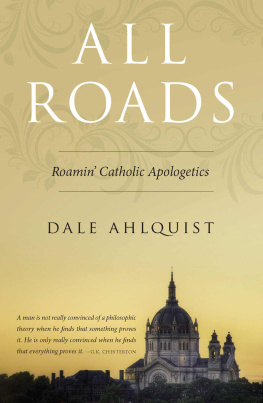
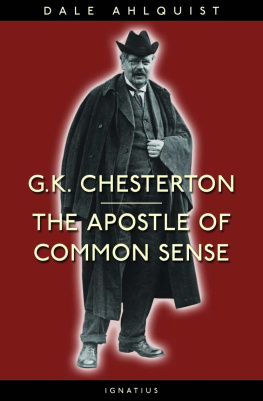
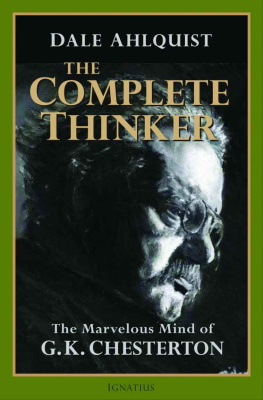
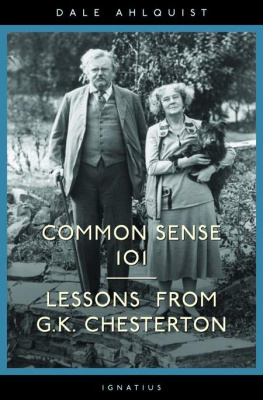

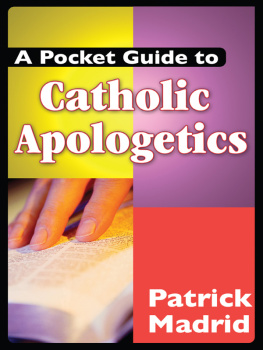
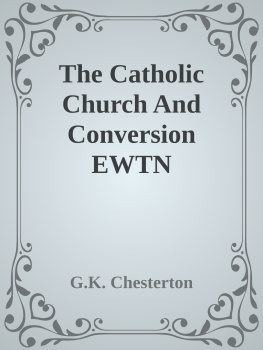

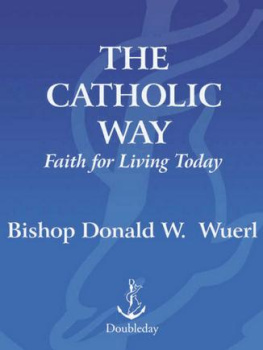
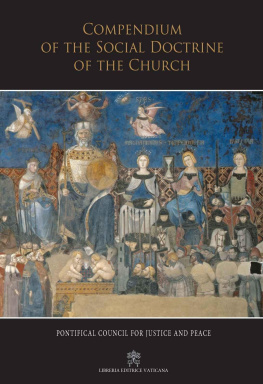
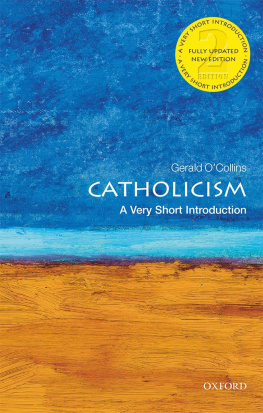
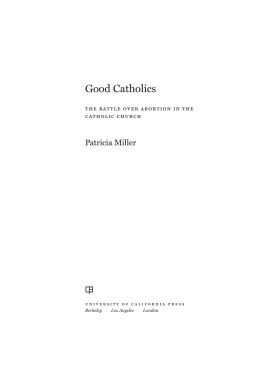
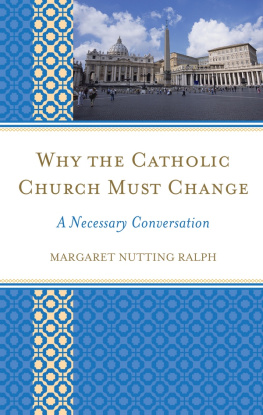
 2015 T HE A MERICAN C HESTERTON S OCIETY Printed in the United States of America Cover photo by Greg Benz Photography Cover design by Richard Aleman Interior design by Ted Schluenderfritz LCCN: 2014944520 ISBN: - - 9744495 - -
2015 T HE A MERICAN C HESTERTON S OCIETY Printed in the United States of America Cover photo by Greg Benz Photography Cover design by Richard Aleman Interior design by Ted Schluenderfritz LCCN: 2014944520 ISBN: - - 9744495 - -